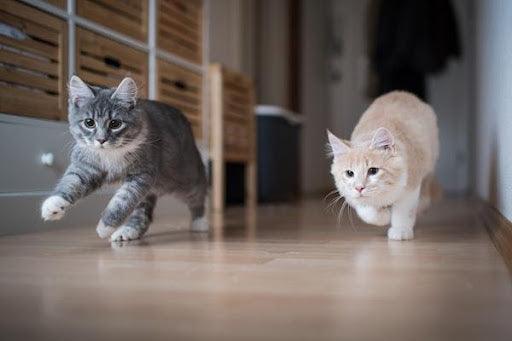Source: https://www.hshv.org/catzoomies/
Cat Zoomies and How to Stop Them | Every cat owner has seen it before—their cat shooting up from where they were lazing only a moment ago, sprinting around the room, and knocking over any object that gets in their way. Cats get these "zoomies" quite often, and they're normal behavior for both cats and dogs. But they cause problems for cat owners, especially if they're happening at night and keeping people awake. We'll tell you everything you need to know about what causes cats to get the zoomies and what you can do to help prevent them.
Related: Dog Zoomies: What It Is and What to Do
What Are Zoomies?
Zoomies take their name from the behavior cats display during them. They'll go from sitting peacefully one second to jumping up and sprinting, or "zooming," around your house in the next. Then, just as suddenly as they started, your cat's bout of zoomies end, almost as if a switch flipped on in your cat and then right back off again.
The technical name for zoomies is Frenetic Random Activity Periods or FRAPs, and cats aren't the only animals who experience them. Dogs can also get the zoomies. And while this behavior may seem bizarre to cat owners, it does have underlying causes.
Why Do Cats Get the Zoomies?
Cats can get the zoomies for different reasons. These are the three most common causes.
Getting Out Excess Energy
All that running around helps cats get out excess energy, especially after a long nap. Cats sleep most of the day—anywhere from 12 to 16 hours—and store up their energy for short bursts of activity. Cats do this because, in their natural habitat, they're ambush predators who need to conserve energy for short bursts of hunting. So if your cat doesn't get enough exercise when they are awake, that pent-up energy can turn into a case of zoomies.
Because kittens and young cats have more energy to expend, they may display this behavior more often, but cats of any age can get energy-induced zoomies. By playing with your cat throughout the day and making sure they get plenty of exercise, you can cut down on the time they spend zooming around your house to get that energy out. Playtime is also a great way to bond with your cat and make sure they live a longer and happier life.

Source: https://www.bayshorelovespets.com/Learning-Why-and-How-Cats-Get-the-Zoomies-1-8640.html
Medical Problems
Cats can get the zoomies while experiencing pain or other medical issues. Feline hyperthyroidism is probably the most serious cause of cat zoomies. Middle-aged and older cats who suddenly start to stay up late, lose weight, and act odd or jittery should get checked by your vet. Cognitive dysfunction syndrome (CDS) and age-related dementia can also be the culprit when previously sedentary senior cats start zooming around your house. | Cat Zoomies and How to Stop Them
Cats may display this behavior after their sense of sight, hearing, or smell changes. When cats can't hear or see as well as they used to, they may start fleeing from dangers that aren't really there. Cats with itchy skin or fleas may also try to escape the unpleasant sensation by running. Arthritic pain, kidney and liver disease, and brain tumors can also cause behavioral changes in cats.
To determine if your cat's zoomies are caused by medical problems instead of excess energy, watch them for signs of pain. If they're irritable or engaging in excess licking or scratching, take them to a vet.
Cats who are anxious or in pain get zoomies more often. Dope Dog makes CBD pet products that can help keep your pet calm and improve their quality of life!
Related: Dog Anxiety: What Dog Owners Need to Know
Problems Pooping
Some cats get zoomies after using their litter box. If this is the case, watch your cat for signs of constipation, which include pooping outside the litter box, vomiting, discomfort, and changes in stool consistency. If your cat doesn't show these symptoms but hasn't gotten post-poop zoomies before now, you may still want to take them to a vet.
Cats without digestive problems can still get zoomies after pooping when their litter box is unclean. They're not running out of discomfort so much as to get away from the smell. You can avoid this problem by cleaning out your cat's litter box frequently.
How to Prevent Cat Zoomies
Cat zoomies can be disruptive, especially if they happen at all hours. Cats who sleep all day can zoom through the night, keeping you or your family awake in the process. Fortunately, there are ways to prevent those middle-of-the-night zoomies so you can get the rest you need.
Cats who get frequent zoomies most likely need more exercise. Make sure your cat gets plenty of playtime during the day. Buy them fun, engaging toys and reserve at least two 15-minute periods each day to play with your cat. Play that simulates hunting and stalking prey is best for wearing cats out, as this engages their mind along with their body. Interactive toys serve this purpose very well. If you set out a toy just before bed, you can wear your cat out so that you get to sleep all night.
If your cat gets zoomies because of a medical condition, treating the medical condition can stop or reduce those zoomies. And cleaning your cat's litter box frequently keeps post-poop zoomies at bay.

Source: https://www.thesprucepets.com/cats-acting-crazy-554821
Related: 10 Ways to Help Your Nervous Dog
Conclusion
Cats can get zoomies for many reasons, including excess energy, medical issues, and problems pooping. And cats who zoom into the night can also keep you awake. But you can help prevent this behavior by making sure your cat gets plenty of exercise, treating any underlying medical conditions, and cleaning out their litter box frequently.
Are your cat’s zoomies keeping you up at night? Dope Dog makes CBD products that help keep your pets calm so you can sleep through the night!


















